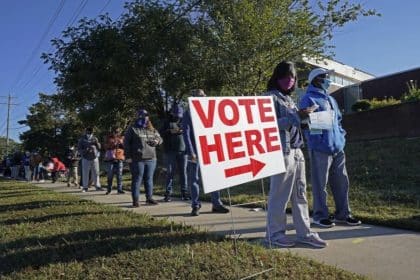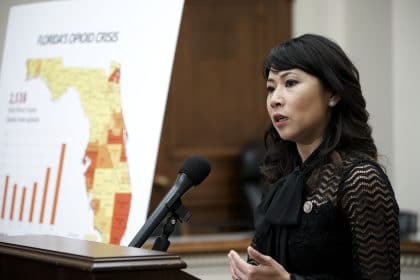Gerrymandering Potential Sways State Legislative Targets

National political parties are targeting a handful of competitive state legislative chambers this year, where the majority parties can draw favorable district lines — with the potential for gerrymandering — after the 2020 census.
The state legislative campaign arms of both parties said wins in Florida, Georgia, North Carolina, Pennsylvania, Texas and Wisconsin would help win congressional majorities for the next decade. Those six states send a total of 116 representatives to the U.S. House — more than a quarter of the entire voting body. Republicans outnumber Democrats in their combined delegations, 69-46, with one vacancy in Wisconsin.
Both chambers of the legislature in all six states are now held by Republicans, and all empower their legislatures to draw congressional district lines.
The first election cycle of a decade carries added importance because the winners will use the new census to draw district lines, which generally stay in place for 10 years. By percentage, the closest chamber to flipping is the Pennsylvania House, where Democrats would need to win 4.9% of seats now vacant or held by Republicans for a majority. The greatest gap is in the Georgia Senate, where Democrats would have to flip 14.3% of all seats.
Matt Harringer, a spokesman for the Democratic Legislative Campaign Committee, which focuses on state legislatures, said the party was caught off-guard in the 2010 cycle, when Republicans spent heavily in state races and netted close to 700 seats nationwide.
Learning from that cycle, the DLCC and allied groups are spending money and attention on state races this year, which should give the party a better chance of competing in 2020. So too should the presidential election, which tends to increase Democratic turnout, Harringer said.
“It’s a once-in-a-two-decade thing,” he said. “Because it’s only every other census that we get it lined up with a presidential year.”
The DLCC said on Jan. 16 it would spend $50 million on what it called its “Flip Everything” campaign. And at least one Democrat-aligned group, Swing Left, is also spending in state legislative races, choosing targets based on redistricting.
The Republican State Leadership Committee, the DLCC’s counterpart, has acknowledged it likely will be at a funding disadvantage this cycle, but it has pledged to prioritize races in Ohio, as well as Florida, Georgia, North Carolina, Pennsylvania, Texas and Wisconsin. Losses in 42 races in those seven states would affect 136 congressional races, the group said.
The limited target list comes as a growing movement to take the line-drawing process away from politicians has picked up steam. Control over the Arizona state Legislature is in play, but the state adopted an independent commission for redistricting in 2000. Similarly, Pennsylvania, New York and several other states have adopted some form of a line-drawing commission.
Going into the 2020 state legislative elections, Republicans control the majority of the legislatures, according to Adam Kincaid, the executive director of the National Republican Redistricting Trust, which supports the GOP’s legal and data efforts in redistricting.
“The GOP is still in a very strong position going into the next cycle,” Kincaid said, noting that the party controls legislatures in states projected to gain seats, like Texas, Florida and North Carolina. “We’re still at pretty much the highest point we have been in the last century.”
Democrats feel they’re on offense at the ballot box, Harringer said, and some of their targets show it. The Texas House, for example, hasn’t seen a Democratic majority in 18 years. The party would need to pick up nine seats this cycle to change that trend.
The party points to former Democratic Rep. Beto O’Rourke’s Senate race in 2018 as a sign it can close that gap. Though O’Rourke, a Democrat, lost the race to GOP incumbent Ted Cruz, he carried nine state legislative seats now controlled by Republicans.
Texas’ size — it’s the largest not to use an independent commission for its maps — and projected growth make it critical for both parties this cycle.
If Democrats can successfully make the Lone Star State a battleground, it will help the party outside the state’s borders as well, forcing Republicans to draw resources from other competitive states.
“When Republicans are going to be forced to defend Texas and spend millions and millions of dollars there, it makes it harder for them to spend in a place like Minnesota,” Harringer said.
Patrick Rodenbush, a spokesman for the National Democratic Redistricting Committee, pointed out that a number of suburban congressional seats have trended blue the last few cycles, further helping the effort to take over the Texas house.
“In districts where the (Democratic Congressional Campaign Committee) may be investing a lot of money, there are a few potential state legislative pickups as well,” Rodenbush said.
Flipping a chamber in Texas, as in Florida, Georgia or Wisconsin, would break a Republican trifecta — control in both legislative chambers and the governor’s office. In all states but Minnesota, one party controls both legislative chambers going into the 2020 elections.
Similar, for redistricting purposes, is North Carolina. The state doesn’t give its governor, Democrat Roy Cooper, the power to veto maps drawn by the Republican-controlled Legislature.
Rodenbush called the path to flipping a chamber in Tar Heel State “tough but doable,” pointing out that the legislative elections will use new maps drawn after a 2018 state court ruling that found the North Carolina lines represented an unconstitutional partisan gerrymander.
Ballot-box battles represent one front of an expanding struggle over legislative maps, as both parties have stood up their own organizations to fight for better maps for their side. That may involve courtroom battles, advocacy for state initiatives or political campaigns. For instance, the NDRC’s separate foundation filed the state court suit that resulted in North Carolina’s new maps.
Democrats don’t even have to flip entire chambers in some cases to increase their power over maps. In Kansas, the DLCC is aiming to flip enough seats to break GOP supermajorities in each legislative chamber. Such a win would give Democratic Gov. Laura Kelly real veto power, without the possibility that her veto could be overridden on party-line votes.
In Ohio, a new redistricting process requires that at least half of both parties vote for the new lines in order for them to go into effect. Rodenbush said that means that every seat Democrats gain there matters, even if they don’t flip the entire chamber.
“It really is important for Democrats to pick up a few more seats there,” Rodenbush said.
———
©2020 CQ-Roll Call, Inc., All Rights Reserved
Visit CQ Roll Call at www.rollcall.com
Distributed by Tribune Content Agency, LLC.























